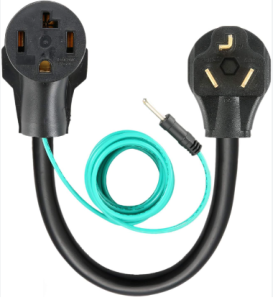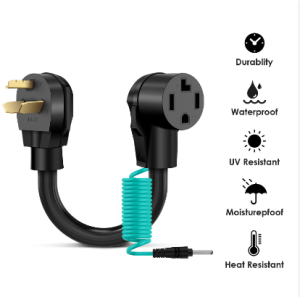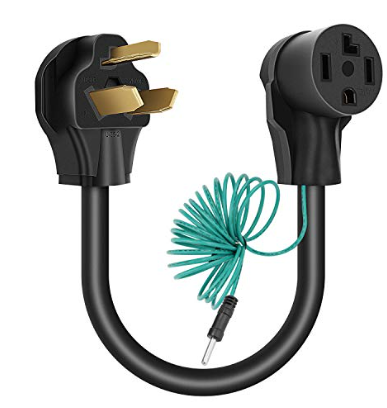Dryer Plug Adapter
In today’s modern world, where convenience and efficiency are paramount, household appliances play a crucial role in our daily lives. Among these, the clothes dryer stands out as a time-saving and indispensable device, especially when it comes to laundry chores. However, what happens when you move to a new location or purchase a dryer with a plug that doesn’t match your existing outlet? This is where a dryer plug adapter comes into play, allowing you to connect your dryer to different types of electrical outlets without the need for expensive rewiring. In this comprehensive guide, we’ll explore the ins and outs of dryer plug adapters, helping you make an informed decision when choosing the best one for your needs.
Understanding Dryer Plug Types:
Before delving into the intricacies of dryer plug adapters, it’s important to understand the various dryer plug types that exist. In the United States, there are three primary types of dryer plugs: the NEMA 14-30, NEMA 10-30, and NEMA 6-30. Each of these plugs corresponds to a different electrical outlet configuration, and your choice of dryer plug adapter will depend on the type of plug your dryer uses and the outlet available in your living space.
NEMA 14-30: This is the most common type of dryer plug, featuring four prongs (two hot wires, a neutral wire, and a ground wire). It’s commonly found in modern homes and provides both 125V and 250V options for electric dryers.

NEMA 10-30: This plug also has three prongs, but it lacks a grounding wire. It’s an older design and can still be found in some homes. However, it’s important to note that NEMA 10-30 outlets are not grounded, which can pose safety concerns.
NEMA 6-30: Similar to the NEMA 14-30, this plug has three prongs and is used for electric dryers that require only 240V power. It’s essential to ensure that your dryer is compatible with this type of plug before purchasing an adapter.
Choosing the Right Dryer Plug Adapter:
When it comes to selecting the best dryer plug adapter, there are a few key factors to consider:
Plug and Outlet Compatibility: The first and foremost consideration is ensuring that the adapter you choose is compatible with your dryer’s plug and the electrical outlet in your home. The adapter should match both the plug configuration and the voltage requirements of your dryer.
Safety: Safety should always be a top priority. Opt for adapters that are made from high-quality materials and have undergone proper testing and certification. Look for adapters that feature surge protection, overheating protection, and a secure fit to minimize the risk of electrical hazards.

Build Quality: Durability is important to ensure that the adapter lasts over the long term. Look for adapters that are well-built and have a robust design to withstand regular usage.
Ease of Use: A good adapter should be easy to install and remove. Some adapters come with user-friendly features like a locking mechanism or clear instructions, making the setup process hassle-free.
Versatility: If you plan on moving or if you frequently find yourself in different locations, a versatile adapter that can work with multiple plug types and outlets can be a valuable investment.
Brand Reputation: Opt for adapters from reputable and well-known brands. Research customer reviews and ratings to gain insights into the experiences of other users.
Top Picks for the Best Dryer Plug Adapters:
AC WORKS 4-Prong Dryer Plug Adapter: This adapter is designed to convert a NEMA 14-30 plug to a NEMA 6-20 or 6-15 outlet. It’s made with high-quality materials and features a durable construction. The adapter also includes a grounding pin to ensure safety.
Parkworld 886603 Dryer Splitter: If you have limited outlets and need to connect both your dryer and another appliance, this splitter can be a convenient solution. It converts a NEMA 14-30 plug into two NEMA 6-15/20 outlets, allowing you to use your dryer and another device simultaneously.
Epicord Dryer Adapter Plug: This adapter is designed for converting a NEMA 14-30 plug to a NEMA 10-30 outlet. It features a compact and user-friendly design, making it easy to install. Additionally, it includes a built-in surge protector for added safety.
AC WORKS 3-Prong Dryer Plug Adapter: If your dryer uses a 3-prong NEMA 10-30 plug and you need to connect it to a NEMA 14-30 outlet, this adapter is a reliable choice. It’s designed with safety features and offers a secure connection.
Conntek 14301 Dryer Adapter Cord: This heavy-duty adapter cord is ideal for converting a NEMA 14-30 plug to a NEMA 6-50 outlet. It’s built to withstand rugged conditions and features molded connectors for enhanced durability.
Navigating the Selection of the Best Dryer Plug Adapter
Choosing the right dryer plug adapter can be crucial to ensuring compatibility and safety. With different plug types and voltage requirements around the world, selecting the best adapter requires careful consideration. This guide outlines the key factors to consider when choosing a dryer plug adapter.
Research the Plug Types:
Begin by researching the plug types used in the country where your dryer will be used. Common plug types include Type A, Type B, Type C, Type D, Type E, Type F, and Type G. Verify the plug type of your dryer and the plug type used in your destination country.
Voltage and Frequency:
Check the voltage and frequency requirements of your dryer and compare them to the electrical standards of the destination country. Some countries use 110-120V at 60Hz, while others use 220-240V at 50Hz. Using the wrong voltage can damage your dryer and pose safety risks.
Adapter vs. Voltage Converter:
Understand the difference between a plug adapter and a voltage converter. A plug adapter simply allows your dryer’s plug to fit into a different outlet type, while a voltage converter modifies the electrical voltage to match your dryer’s requirements. Make sure you know whether you need just an adapter or both an adapter and a converter.
Safety Certifications:
Look for certifications such as CE, RoHS, and UL when choosing an adapter. These certifications indicate that the product has met safety and quality standards, reducing the risk of electrical hazards.
Build Quality and Durability:
Invest in a well-made adapter that will last. Look for adapters with sturdy construction and materials designed to withstand wear and tear.
Universal Adapters:
Universal adapters can be a convenient option if you plan to travel to multiple countries. These adapters often have adjustable pins or a variety of detachable plugs to accommodate different outlet types.
Check Reviews and Recommendations:
Read customer reviews and seek recommendations from reliable sources. Online marketplaces and forums can provide insights into the performance and reliability of specific adapter brands and models.
Check for Compatibility:
Ensure that the adapter is compatible with the type of plug used by your dryer. Some adapters may not support grounded or polarized plugs, so make sure the adapter matches your dryer’s plug configuration.
Wattage and Amperage Ratings:
Consider the wattage and amperage ratings of the adapter to ensure it can handle the power requirements of your dryer. Exceeding these ratings can lead to overheating and potential damage.
Travel-Friendly Features:
If you’re planning to move frequently, consider compact and lightweight options that are easy to pack and carry.
Remember that safety should always be a top priority. If you’re unsure about which adapter to choose, consult a qualified electrician or professional to ensure you select the right adapter for your specific needs and avoid any risks associated with electrical compatibility issues.
Conclusion:
A dryer plug adapter can be a lifesaver when it comes to ensuring that your dryer can be used with the available electrical outlets. By understanding the different types of dryer plugs, considering factors such as compatibility, safety, build quality, and ease of use, and exploring some top-notch adapter options, you can confidently choose the best dryer plug adapter for your specific needs. Always prioritize safety and quality when making your decision, and enjoy the convenience of using your dryer without the hassle of outlet compatibility issues.
FAQs about the Best Dryer Plug Adapter
What is a dryer plug adapter, and why do I need one?
A dryer plug adapter is a device that allows you to connect your dryer’s plug to an outlet with a different configuration. It’s essential when you move or encounter outlets that don’t match your dryer’s plug type. This adapter ensures a safe and secure connection without requiring expensive electrical modifications.
How do I determine the right dryer plug adapter for my needs?
To find the best dryer plug adapter, you need to match the plug type of your dryer with the outlet type you’re connecting to. Common plug types include NEMA 10-30P, NEMA 14-30P, and NEMA 6-30P, while outlets vary in voltage and configuration. Make sure to check your dryer’s specifications and the outlet you’ll be using before purchasing an adapter.
What safety features should I look for in a dryer plug adapter?
Safety is paramount when dealing with electrical connections. Look for adapters with built-in surge protection, grounding mechanisms, and robust insulation to prevent electrical hazards, overheating, and short circuits. Additionally, check for adapters that comply with relevant safety standards and certifications.
Are there universal dryer plug adapters available?
While some adapters claim to be universal, it’s still crucial to confirm compatibility with your specific dryer and outlet types. Universal adapters might not cover every possible combination, and using the wrong adapter could result in electrical damage or fire hazards. Always verify compatibility before purchasing.
Can I use a dryer plug adapter to convert voltage or frequency?
Dryer plug adapters are designed primarily to address plug type mismatches, not voltage or frequency conversions. If you’re moving between countries with different electrical systems, you’ll likely need a voltage converter or transformer in addition to a plug adapter. Attempting to use an adapter for voltage conversion can damage your appliances and pose serious safety risks.
